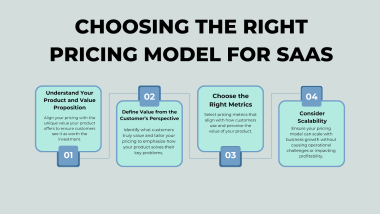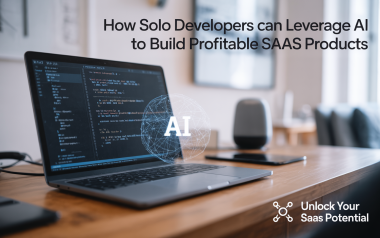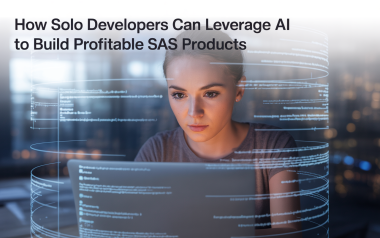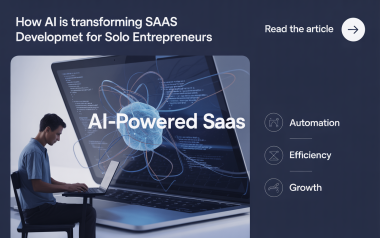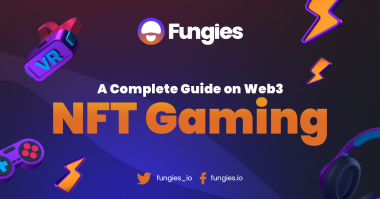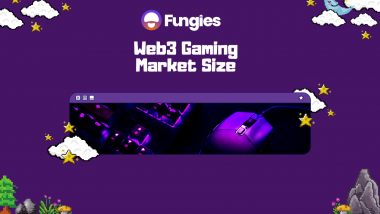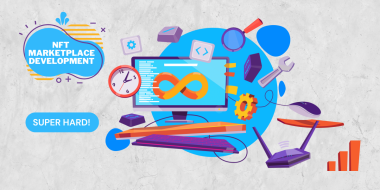Solo SaaS founders now have unprecedented opportunities to compete with larger teams by leveraging AI tools throughout the development lifecycle. By embracing artificial intelligence and automation, individual developers can significantly reduce the time and resources needed for building, launching, and scaling successful SaaS products.
Key Takeaways
- No-code platforms like Bubble.io and Webflow can dramatically accelerate development cycles for solo founders
- Implementing AI-driven customer support allows for scaling user interactions without adding staff
- Fundraising effectiveness can be enhanced through AI-powered data analysis and personalized pitching
- Resource limitations can be overcome with strategic outsourcing and scalable technology choices
- Staying current with generative AI tools provides competitive advantages in product innovation
Accelerating Development with AI Tools
The development landscape has transformed dramatically for solo founders with the emergence of AI-powered tools. I’ve found that combining no-code platforms with AI assistance can reduce development time from months to weeks.
No-code tools like Bubble.io, Flutterflow, and Webflow enable rapid prototyping without extensive coding knowledge. These platforms allow solo developers to focus on business logic and user experience rather than getting bogged down in implementation details.
For those with coding experience, AI-powered development environments offer significant productivity boosts. Tools worth exploring include:
- NextJS for React-based applications
- Cursor AI for code completion and generation
- LangChain for connecting language models to your applications
Integration of AI services like HuggingFace can add advanced capabilities to your SaaS product without requiring expertise in machine learning. This approach allows solo founders to offer features that previously demanded specialized teams.
Creating AI-Powered Customer Support
Customer support often becomes a bottleneck for solo founders attempting to scale. Implementing conversational AI tools can help manage customer inquiries 24/7 without hiring additional staff.
Virtual assistants can be trained on your product documentation to handle common questions and troubleshooting. I’ve seen solo founders reduce their support workload by up to 70% through strategic AI implementation.
Consider these approaches for AI-powered customer support:
- Chatbots integrated with your knowledge base
- Email response automation for common inquiries
- Sentiment analysis to flag urgent issues requiring personal attention
The key is finding the right balance between automation and human touch. Even with AI handling the bulk of inquiries, maintaining some personal connection with customers remains important for building loyalty.
Enhancing Fundraising with AI Insights
Securing funding as a solo founder presents unique challenges that AI tools can help address. Data analysis powered by AI can identify your most compelling metrics and growth patterns to highlight in investor pitches.
AI-driven research can also help target investors more effectively. By analyzing investor portfolios and interests, you can personalize your approach to each potential funder, increasing your chances of success.
Practical ways to leverage AI in fundraising include:
- Using AI to analyze market trends relevant to your product
- Creating data visualizations that highlight growth potential
- Developing financial projections based on actual usage patterns
Remember that investors fund people as much as products. While AI can enhance your pitch, demonstrating your personal expertise and passion remains essential for fundraising success.
Overcoming Solo Founder Limitations
Limited resources represent the biggest challenge for solo SaaS founders. I recommend addressing this through selective outsourcing of non-core functions to part-time contractors or freelancers.
Content creation, design work, and specialized development can often be outsourced effectively. This approach allows you to maintain quality standards without the overhead of full-time employees.
Technology choices also play a crucial role in overcoming limitations. Focus on scalable stacks that can grow with your business:
- Node.js for backend development
- React for frontend interfaces
- PostgreSQL for database needs
Successful solo founders like Pieter Levels have demonstrated that a minimalist approach to both team and technology can result in highly profitable businesses. Focusing on simplicity and automation from the start creates a foundation for sustainable growth.
Staying Current with AI Trends
The AI landscape evolves rapidly, creating both challenges and opportunities for solo SaaS founders. I recommend setting aside time each month to explore emerging AI tools and evaluate their potential impact on your product.
Generative AI tools represent one of the most promising areas for SaaS products. These technologies enable creative content production and can add significant value to applications in nearly every industry.
Areas worth monitoring include:
- Advances in natural language processing
- Computer vision applications for your industry
- Predictive analytics that could enhance your offering
Building relationships with AI-focused communities can help you stay informed without overwhelming research demands. Online forums and local tech meetups often provide practical insights about which new technologies are actually useful versus just trendy.
Learning from Success Stories
Several solo developers have built multi-million dollar SaaS businesses by embracing AI and automation. Mike Perham, creator of Sidekiq, demonstrates how focusing on a specific developer pain point can lead to substantial success as a solo founder.
Strategic partnerships can also multiply your effectiveness. Companies like Rapid Developers specialize in helping solo founders leverage no-code and low-code platforms to accelerate development cycles and reach market faster.
Common patterns among successful solo SaaS founders include:
- Starting with a minimal viable product
- Implementing automation from day one
- Focusing on recurring revenue models
- Building in public to gather feedback early
The most successful solo founders maintain a balanced perspective on technology. They leverage AI and automation aggressively while still keeping their focus on solving real customer problems effectively.
Sources
YouTube: Building SaaS Products with AI
RapiDevelopers: Can a Solo Developer Build a SaaS App
SaaS AI Tools
Dev.to: My Solo Developer Stack to Make a SaaS
Callin.io: Can a Solo Developer Build a SaaS App
